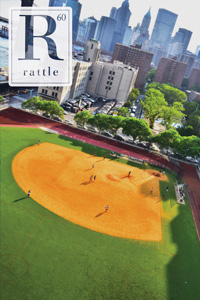 Review by Sara E. Lamers
Review by Sara E. Lamers
SOME NIGHTS NO CARS AT ALL
by Josh Rathkamp
Ausable Press
1026 Hurricane Road
Keene, New York 12942
ISBN: 978-1-931337-35-9
2007, 91 pp., paper, $14.00
www.ausablepress.org
The poems within Some Nights No Cars At All are poems of distance–the distance we have to travel to get to the person who resides within the same walls we do, the distance to overcome childhood bruises, to see things as they truly are and not as what they appear to be. They are poems that reveal the darkness of relationships, of the way we are apt to wound one another, the way we try to make up, succeed and fail, learn to muddle through and keep on going.
Sure we’ve read poems that tackle these themes before, but it is the way Rathkamp presents tension softly and carefully, breaking the bad news gently that compels the reader onward. As in “June in the Desert,” where the narrative turns from the destruction “out there” to the cold facts in front of the speaker:
Last night my girlfriend said
that there wasn’t a burning
between us, nothing that would make
her tape her life to mine.
Yet the speaker clings to a strand of hope, explaining “but still we decide to wait/ for something to grow/ into something else.” And we sense the pointlessness but appreciate the honesty, knowing that any of us would try to reassure ourselves in the very same way.
What is striking about these “relationship” poems of Section I is the rift that divides the two people despite the close physical proximity. Perhaps it’s in the matter-of-fact way the speaker decides to present this heartache that makes these poems we suppose we’ve heard before so rich:
She looks back at me as if I were her coffee cup,
as if I were the one
worth setting down then leaving, and leaving
was nothing but one foot in front of the other
(“Eclipse”)
There’s a degree of reserve here, of admitting—but not fully—the harsh truth, and this keeps these poems from slipping into the territory of cliché.
Also central to the collection is a knowledge of the ways in which we construct fronts to hide behind, pretend danger cannot truly harm us. In “The Winter of 1990” the speaker remembers a boyhood ritual of hurling “piles of ice balls/ each one dipped in a bucket of water” at schoolmates that “left strawberry bruises on [their] chests.” The boys’ bravado, the invincibility of youth that provides a false shield is compelling, as is the recognition that comes by the end of the poem of the boys’ helplessness as they sit “frozen,/ scared as deer.” Section II abounds with these and other “coming-of-age” musings that reveal a discovery of the dark edge that innocent games bear. One admires the speaker’s restlessness, his desire to escape the routine and desperation of the workaday life, to
be crazy, not end up like my father
or brothers or friends who had grown roots
too long in a town surrounded
by streams
(“Tattoo”)
even while the speaker feels a kinship, a kind of reverie to this home.
Section III offers a more lyrical sequence, dream-like, mythical kinds of poems that are not exactly surreal but in some ways other-worldly. Thematically, nothing obvious binds these poems to one another. The poems range in their degree of personal–sometimes the “I” voice fixes itself at the center of the world, other times the images are given to the reader unfiltered, pure: a “dead priest [who] waves his hand,” (“Day of the Dead”) a boy who “pisses behind a dark dumpster,” (“Procession of the Dead”) a candle flame that “burns star into star” (“Candle”). A series of four “Missing City” poems closes the section, pieces which harken back, albeit subtly, to the unraveling relationship of Section I, the place where the speaker resides alone. It is a city “dumb and blind with snow./ The night never expects night to end” (“Missing City 2”).
The collection draws to a close with another type of “relationship” poem, though this time the outlook appears brighter, as in “Today is Garage Sale Day” which closes with the promise that
he will carry whatever she holds
in her hands at the time. . .
and on the way to the car he will offer
a gift of certainty.
He will offer her his hand.
Yet still some poems contain a longing for the naïve time before heartache reared forth: “now, it seems, no one laughs/ at the way we want love” (“I Just Called to Say”). In the end it is the vow of the final poem that buoys us, assures us that despite heartache and our humanness, the ways we are sure to sabotage our own joy, that “whatever happens,/ and what little life we have left/ we will spend” (“Our Last Evening. . .”).
____________
Sara E Lamers is the author of a collection of poetry: A City Without Trees (March Street Press). Other work has appeared in journals such as Fugue, Main Street Rag, and The MacGuffin. She teaches at Lawrence Technological University in Southfield, MI and received an MFA from Purdue University.







